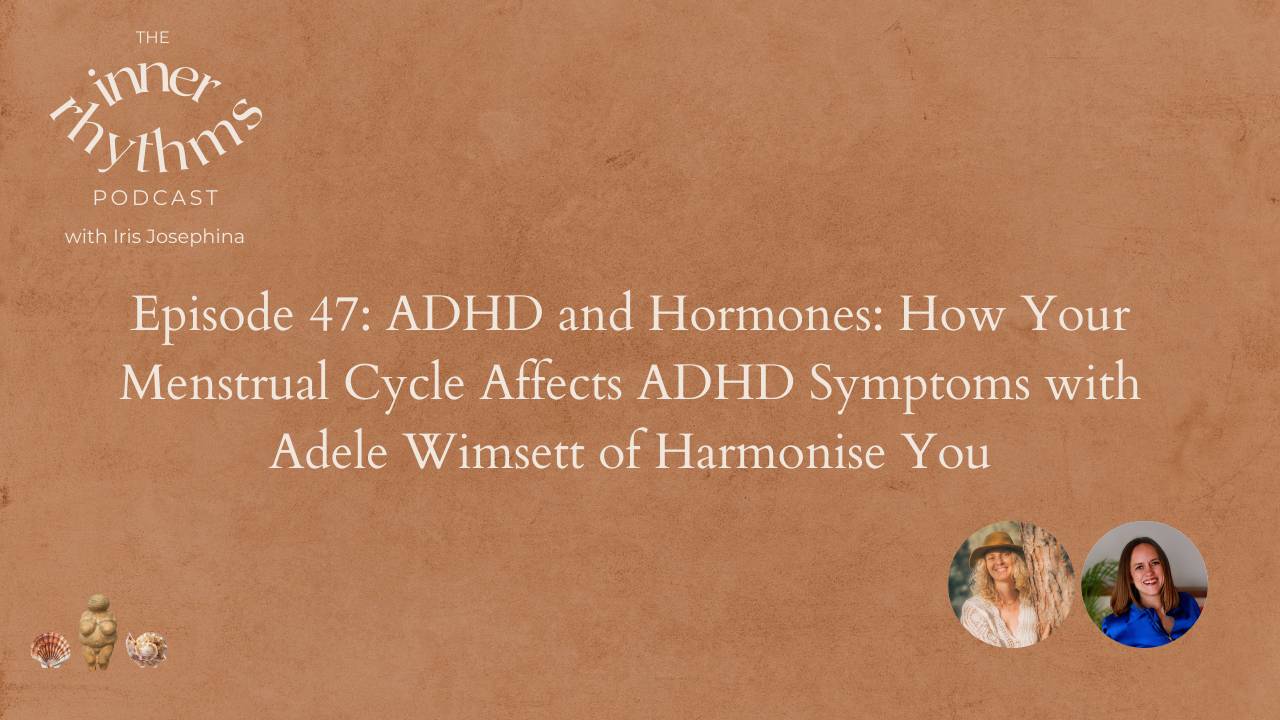Episode 47: ADHD and Hormones: How Your Menstrual Cycle Affects ADHD Symptoms with Adele Wimsett of Harmonise You

As someone with ADHD, this episode was incredibly validating and useful for me, and I hope that everyone listening who is neurodiverse, suspects they might be, or has ADHD finds it to be a nourishing balm to their soul. I had the honor of sitting down with Adele Wimsett from Harmonise You to discuss the impact of our hormones on ADHD throughout our monthly cycles and life seasons.
In this enlightening episode, Adele shares her journey from working in youth justice to becoming a women's health practitioner specializing in ADHD and hormonal health. We explore the complex relationship between hormonal fluctuations and ADHD traits, uncovering why certain phases of your cycle might intensify your symptoms while others bring relief.
By tuning in, you'll learn:
- How estrogen and progesterone affect ADHD symptoms throughout your menstrual cycle
- Why the luteal phase (before your period) can be especially challenging for women with ADHD
- The surprising connection between pregnancy, postpartum, perimenopause and ADHD symptoms
- Why ADHD women are at higher risk for conditions like PMDD and postnatal depression
- Practical strategies to manage both your hormonal health and ADHD
- How to adapt your environment to work with your neurodivergent brain, not against it
- The importance of finding community with others who understand your experience
Topics Covered
In this open and honest conversation, Adele and I dive deep into the overlooked intersection of hormonal health and neurodiversity. We share our personal experiences of diagnosis and the validation that comes with finally understanding your brain.
Some key highlights:
- Adele's journey from youth justice work to specializing in women's health and ADHD
- The validation and sometimes grief that comes with adult ADHD diagnosis
- Details on how estrogen acts as "the sexy party girl" hormone that enhances dopamine
- Why progesterone (the "zen yoga chick" hormone) can make ADHD traits more challenging
- The profound effect of hormonal fluctuations during pregnancy and postpartum
- The gender bias in ADHD research and treatment that ignores women's hormonal experiences
- Practical tips for managing blood sugar, which is crucial for both ADHD and hormonal health
- Strategies for creating an ADHD-friendly lifestyle that works with your cycle
- The importance of self-compassion and letting go of neurotypical expectations
- Simple environmental adaptations that can make daily life easier with ADHD
About Adele Wimsett
Adele Wimsett is a women's health practitioner and cyclical living guide who has co-authored the book Essential Feminine Wisdom. With a background in youth justice and special educational needs, she brings a unique perspective to her work with neurodivergent women.
After being diagnosed with ADHD herself, Adele combined her professional expertise in women's health with her personal experience to create specialized support for women navigating both ADHD and hormonal fluctuations. She is passionate about educating women and girls on how to harness the power of their cyclical nature, from menarche to menopause.
Adele bridges the gap between scientific research and holistic approaches, supporting women to balance their hormones naturally. Her work focuses on helping ADHD women understand how their hormones affect their traits and developing personalized strategies that work with their unique neurological makeup.
As the founder of Harmonize You, Adele offers resources, coaching, and community for women seeking to understand and work with both their hormones and neurodiversity.
Connect with Adele:
- Website: https://harmoniseyou.co.uk/
- Facebook: https://www.facebook.com/harmoniseyou
- Instagram: https://www.instagram.com/harmoniseyou/
Listen to the Episode
Timestamps
[00:00:00] Introduction to the episode about ADHD and hormones featuring Adele Wimsett
[00:00:37] Background on Adele as a women's health practitioner and cyclical living guide
[00:01:22] Podcast introduction and Iris's background
[00:02:10] Beginning of the interview with Adele
[00:02:35] Adele's journey from youth justice to women's health
[00:04:26] Adele's ADHD diagnosis and the lack of research on ADHD and hormones
[00:06:04] Iris shares her experience of being diagnosed with ADHD at 33
[00:06:39] The validating experience of diagnosis and self-compassion
[00:08:29] Acknowledging the grief that can come with late diagnosis
[00:09:25] Discussion of rejection sensitivity dysphoria in women with ADHD
[00:10:42] How the menstrual cycle and ADHD are connected
[00:11:51] Research showing ADHD women are at greater risk for PMDD
[00:12:14] Role of neurotransmitters and gender bias in ADHD research
[00:14:05] Applying menstrual cycle awareness with ADHD
[00:14:59] How ADHD symptoms fluctuate throughout the menstrual cycle
[00:15:43] Explanation of estrogen as "the sexy party girl" hormone
[00:16:36] Progesterone's role as "the zen yoga chick" balancing estrogen
[00:17:08] Why the luteal phase can be challenging for neurodivergent women
[00:18:25] Patterns of symptom fluctuation throughout the cycle
[00:18:46] Discussion of pregnancy and progesterone levels for ADHD women
[00:19:34] The "estrogen glow" of pregnancy and its effects on ADHD traits
[00:19:50] Postpartum hormonal drop and vulnerability for ADHD women
[00:20:45] The importance of advocating for yourself during hormonal transitions
[00:21:51] Discussion of healthcare system improvements needed for ADHD women
[00:22:29] Dreams for more research and hormone-aware ADHD treatment
[00:23:14] Challenges of applying cycle awareness within employment constraints
[00:23:39] Health strategies Adele uses to manage her ADHD
[00:25:15] Practical tips for people with ADHD and menstrual cycles
[00:25:40] The connection between blood sugar, inflammation and ADHD
[00:26:23] The importance of gut health for dopamine and serotonin
[00:26:57] Tracking traits against hormonal fluctuations
[00:27:22] Embracing imperfection and the 80/20 approach
[00:27:53] The challenge of consistency for people with ADHD
[00:28:47] Acceptance that consistency looks different with ADHD
[00:29:05] Environmental adaptations that make life easier with ADHD
[00:29:54] Using habit trackers and external reminders
[00:31:09] Creating personalized organizational systems
[00:31:57] Parenting while reparenting yourself
[00:33:06] The challenges of parenthood with ADHD
[00:34:34] The importance of planning and boundaries for neurodivergent parents
[00:36:45] Adele's wisdom for listeners with ADHD
[00:37:14] Finding community and accepting your unique needs
[00:38:06] The freedom of connecting with other neurodivergent people
[00:38:33] Where to find Adele online
[00:39:04] Episode wrap-up and how to connect with Iris
Hormones and ADHD: The Overlooked Connection
Adele explains that while hormones don't cause ADHD, they significantly influence how symptoms manifest throughout the menstrual cycle. Research has shown that ADHD women are at much greater risk for conditions like Premenstrual Dysphoric Disorder (PMDD)—about 45% compared to 28% in the general population.
"There is no causal factor. I think this is where some of the confusion can come. We're not saying, 'Oh my gosh, your hormones are out. Therefore, you have ADHD.' It's about acknowledging that the two influence each other significantly."
A key insight concerns how hormones affect neurotransmitters associated with ADHD:
"We believe that dopamine, our neurotransmitters, play a role in this... And we know that hormones, for example, estrogen, sensitize dopamine. So, it blows my mind to think we're completely ignoring that fact."
This explains why many women with ADHD notice their symptoms changing dramatically throughout their cycle.
The Hormonal Rollercoaster: Estrogen vs. Progesterone
Understanding how specific hormones affect ADHD symptoms can help you anticipate and prepare for challenging days.
Estrogen ("The Sexy Party Girl")
Predominant in the first half of your cycle (follicular phase), estrogen boosts dopamine sensitivity and improves executive function.
"When she's there in her Goldilocks amount, she is juicy. She makes us feel good, makes us want to socialize. She's sensitizing that dopamine. She's lifting that serotonin."
During this phase, many ADHD women feel more focused, energetic, and capable of executing their typical coping strategies.
Progesterone ("The Zen Yoga Chick")
Rising after ovulation, progesterone can make ADHD symptoms more pronounced as it counterbalances estrogen's dopamine-enhancing effects.
"She comes in and goes 'calm yourself down, estrogen, because too much partying makes us feel crap.'"
This helps explain why many ADHD women struggle most during the luteal phase (between ovulation and menstruation). Coping strategies that worked earlier in the cycle may suddenly become ineffective.
Beyond the Monthly Cycle: Life Transitions
Hormonal fluctuations during major life transitions can dramatically affect ADHD symptoms:
Pregnancy
The first trimester can be challenging due to high progesterone, but as estrogen increases throughout pregnancy, many ADHD women experience significant symptom relief.
"Lots of neurodivergent women find that actually it's the time of their lives because their traits seem to go for a lot of it. I loved being pregnant. I loved how I felt."
Postpartum
The dramatic hormonal crash after childbirth creates particular vulnerability for ADHD women:
"Those first couple of days after pregnancy, our estrogen can drop by up to a thousand times. And then we wonder why women get upset."
This drop can intensify ADHD symptoms at a time when demands are especially high, making postpartum support even more crucial.
Perimenopause
Many women receive their first ADHD diagnosis during perimenopause, as hormonal fluctuations can unmask or intensify traits that were previously manageable.
Practical Strategies for Living with Hormonal ADHD
Adele offers several actionable recommendations:
1. Balance Your Blood Sugar
"It's an absolute game changer. ADHD people are much more at risk of type 2 diabetes than neurotypical people."
Stabilizing blood sugar helps minimize both hormonal fluctuations and ADHD symptoms.
2. Support Your Gut Health
"When inflammation comes through the gut, it binds with dopamine and serotonin in the brain, causing them to be inactive."
3. Track Your Symptoms Against Your Cycle
"When you have that written down, it's so powerful and you can use it to advocate for yourself."
4. Embrace Imperfection
"We're very prone to perfectionism. Give yourself a break... aim for an 80/20 approach."
5. Adapt Your Environment
"I need everything out. Otherwise, I'm not going to use it... If I can't see it, it doesn't exist."
Create systems that work with your ADHD brain rather than fighting against it.
6. Find Your Community
"Find your people, find community, stop trying to take advice that works well for people who don't have the same brain as you."
Key Takeaways
- Your ADHD symptoms likely fluctuate predictably with your hormonal cycle
- Estrogen (high in follicular phase) generally improves ADHD symptoms
- Progesterone (high in luteal phase) often makes ADHD symptoms more challenging
- Major hormonal transitions like pregnancy and perimenopause significantly impact ADHD
- Tracking your symptoms against your cycle provides valuable self-knowledge
- Creating an ADHD-friendly lifestyle that accounts for hormonal fluctuations is crucial
- Finding community with other neurodivergent people provides validation and support
Adele reminds us that while both ADHD and hormonal fluctuations present challenges, understanding their intersection empowers us to create lives that work with our unique neurological makeup rather than against it.
About the Host
I’m Iris Josephina—functional hormone specialist, orthomolecular hormone coach, and entrepreneur. Through Cycle Seeds and The Inner Rhythms Podcast, I support people in reconnecting with their cyclical nature, deepening body literacy, and reclaiming hormonal harmony from a place of sovereignty and embodied knowledge. Most people know me from Instagram, where I share stories, tools, and inspiration on cyclical living, menstrual cycles, fertility, hormones and more.
Let’s stay connected:
💻 Visit the Cycle Seeds website



